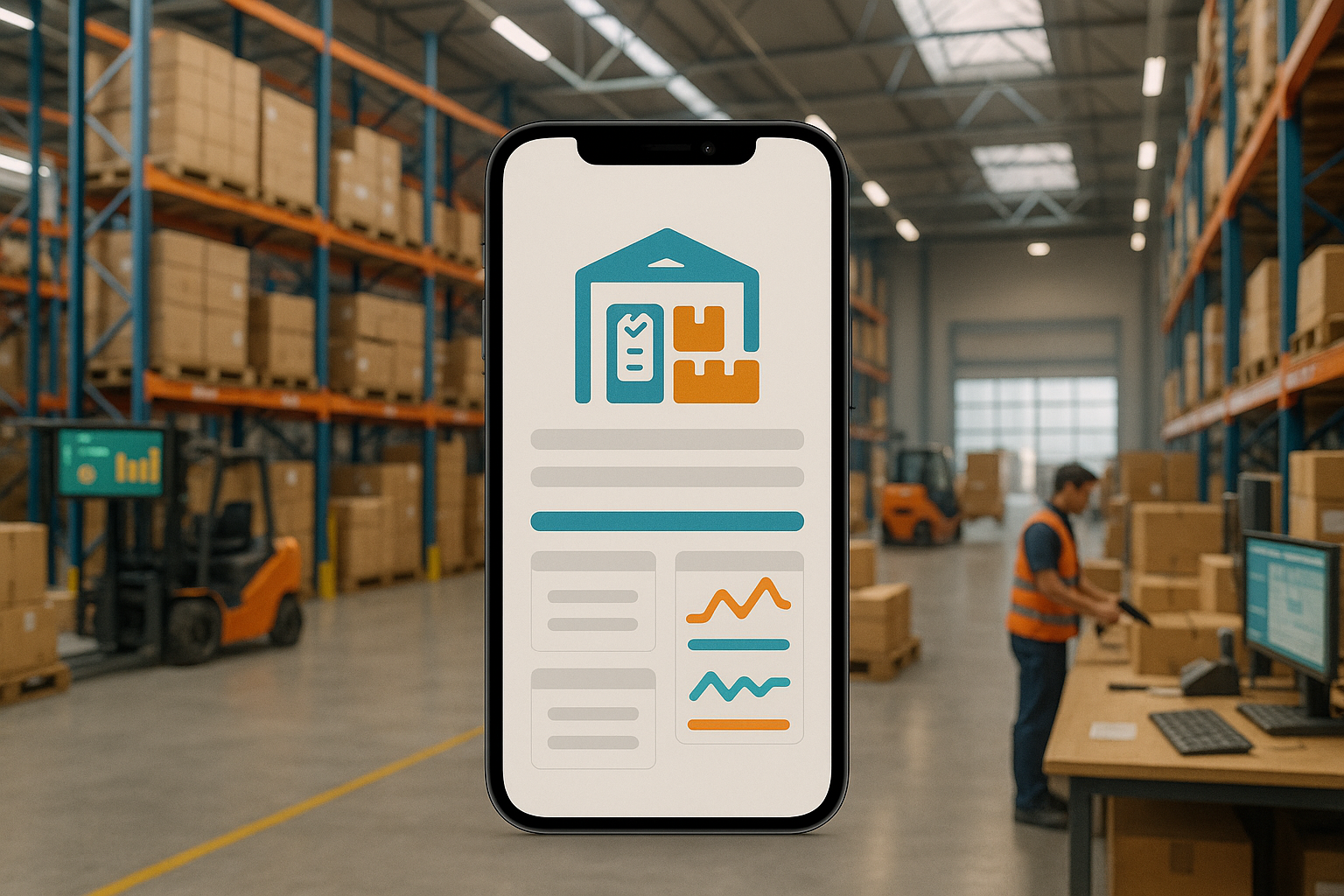Introduction
In today’s fast-paced market, effective inventory management is the backbone of any successful retail, e-commerce, or manufacturing business. Poorly managed stock leads to a cascade of problems: capital tied up in unsold goods, stockouts that disappoint customers, and operational inefficiencies that erode profit margins. While many off-the-shelf inventory management systems exist, they often present a frustrating compromise, forcing businesses to adapt their workflows to the software’s limitations rather than the other way around. This is where the power of custom software development becomes clear.
Developing a bespoke inventory management application is a significant undertaking, fraught with technical complexities ranging from real-time data synchronization to secure third-party integrations. It requires a depth of expertise that few in-house teams possess. This article serves as a comprehensive guide to navigating this challenge. We will explore the essential features of a modern inventory management system, dissect the difficulties of in-house development, and outline the compelling reasons to opt for a custom-built solution.
Furthermore, we will provide a realistic cost estimate for development and introduce the leading companies that can turn your vision into a reality. Among them, we at MetaCTO stand out. As a top US AI-powered app development firm with over two decades of experience, we specialize in creating the sophisticated, scalable, and secure applications your business needs to thrive. We will show you how partnering with an expert agency like ours is the most effective path to building a powerful inventory management app that delivers a true competitive edge.
What is an Inventory Management App?
At its core, an inventory management app is a sophisticated digital tool designed to track goods and materials through the entire supply chain—from procurement to storage to sale. However, a truly effective system is far more than a simple digital ledger. It is a central nervous system for your operations, integrating data, automating processes, and providing actionable insights that drive strategic decisions. Based on industry best practices, a modern, high-performance inventory management app is defined by a suite of essential features.
Centralized Data and Multi-Channel Synchronization
The most critical feature is the ability to centralize all pertinent inventory data. A custom app offers comprehensive oversight of stock levels, complete product histories, and detailed item specifics in one unified dashboard. This centralization ensures that inventory information is perfectly synchronized across multiple channels and departments, whether you operate a single warehouse, a dozen retail stores, or a global e-commerce platform. This single source of truth enhances accuracy, facilitates seamless operations, and empowers teams, regardless of their physical location, to collaborate effectively with uniform and up-to-date data.
Barcoding and Tagging
To eliminate the costly and time-consuming risks of manual data entry, tagging and barcoding are vital. These features are fundamental for minimizing human error. By implementing barcode scanners and tagging systems, the data entry process is significantly accelerated. A task that might take minutes to perform manually can be accomplished in a fraction of a time with a simple scan, improving efficiency and reducing the likelihood of mistakes. This technology also enables the precise tracking of each product’s journey from the warehouse to the customer, ensuring every item is accurately monitored and accounted for.
Real-Time Reporting and Analytics
The ability to generate detailed, real-time reports is an invaluable function. Modern inventory systems provide managers and stakeholders with up-to-the-minute insights into every facet of the business. This can include the physical location of delivery drivers, the current status of warehouse stock, and the progress of incoming shipments. These reporting features ensure that decision-makers are always well-informed and can respond quickly to changing market demands, logistical challenges, or unforeseen inventory issues, turning raw data into a strategic asset.
Inventory Forecasting and Demand Planning
An indispensable feature for any growing business is inventory forecasting. A system with robust forecasting tools can analyze historical sales data to identify trends and patterns, alerting managers to which products are depleting quickly and which are overstocked. This capability is crucial for maintaining customer satisfaction by avoiding stockouts of popular items. Furthermore, it optimizes resource allocation by enabling smarter purchasing decisions, ensuring capital isn’t wasted on slow-moving inventory. By leveraging data, managers can align inventory levels with projected customer demand, striking the perfect balance between supply and need.
Automated Alerts and Notifications
To make inventory management proactive rather than reactive, modern systems elevate efficiency with automated alerts. These tools can be configured to automatically notify managers about critical stock levels, such as when a high-demand item is running low or when a new shipment is delayed. These alerts help preempt potential issues before they become critical problems. This automation saves valuable time and resources that would otherwise be spent on manual stock supervision, allowing your team to focus on strategic tasks instead of constant monitoring.
Robust Security and Data Backup
In an age of increasing cyber threats, data protection is paramount. Advanced inventory management systems provide robust security features to safeguard against unauthorized access and malicious attacks. Just as important are comprehensive backup solutions to prevent data loss in the event of a system failure or security breach. This dual approach to data protection is essential for maintaining operational resilience and ensuring the continuity of business operations without significant disruption.
IoT and Cloud Integration
The integration of the Internet of Things (IoT) with cloud-based systems is transforming inventory management. IoT sensors on shelves or pallets can automatically record and update inventory levels in real-time, providing employees with immediate access to the most current information. The cloud-based nature of these systems means this data can be accessed remotely and securely from any device, ensuring all team members have the information they need at their fingertips. This makes inventory management more dynamic, responsive, and optimized for modern business.
Seamless Integration with Other Business Systems
An inventory management app should not exist in a silo. Its ability to integrate with other critical business systems, such as Enterprise Resource Planning (ERP), Customer Relationship Management (CRM), and accounting software, is a significant advantage. Seamless integration allows for an uninterrupted flow of data across the organization, enhancing the functionality of all connected systems. This creates a unified platform that consolidates various operational facets, leading to improved accuracy and a more holistic view of the company’s performance.
Inventory Optimization
Finally, sophisticated systems offer powerful inventory optimization features. Using advanced algorithms and analytics, these systems guide managers in maintaining the ideal stock balance. They help prevent both overstocking, which ties up capital and increases holding costs, and understocking, which leads to lost sales and customer dissatisfaction. By ensuring inventory levels are precisely calibrated to current business needs, inventory optimization allows for more efficient operations, easier deadline management, and significant cost savings.
Reasons That it is Difficult to Develop an Inventory Management App In-House
While the benefits of a custom inventory management app are clear, the path to building one is laden with technical and strategic challenges. Many businesses underestimate the complexity involved and consider in-house development, only to find themselves struggling with a project that is over budget, behind schedule, and ultimately falls short of its goals. Here are some of the primary reasons why building a sophisticated inventory management system in-house is so difficult.
The Complexity of System Integrations
One of the greatest challenges is integrating the inventory app with a company’s existing tech stack. Businesses rely on a web of interconnected systems—ERPs, CRMs, e-commerce platforms, accounting software, and shipping carriers. Each of these systems has its own API, data structure, and authentication protocols. Building reliable, two-way integrations that ensure seamless and uninterrupted data flow requires deep, specialized engineering expertise. An error in integration can lead to data corruption, inaccurate stock counts, and a complete breakdown of operational workflows.
Ensuring Real-Time Data Synchronization
For an inventory system to be effective, its data must be accurate in real-time. When a product is sold on your website, that information must instantly update the stock levels available to your retail stores, your warehouse team, and your purchasing department. Achieving this level of synchronization across multiple channels and databases is a significant technical hurdle. It requires a robust backend architecture designed to handle concurrent transactions at scale without latency or data conflicts. In-house teams often lack the specific experience in distributed systems needed to build such a resilient architecture.
Developing Advanced Analytics and Forecasting Models
Modern inventory management relies heavily on data science. Features like demand forecasting and inventory optimization aren’t simple calculations; they are powered by complex machine learning algorithms that analyze historical sales data, seasonality, market trends, and other variables. Developing, training, and deploying these models requires a dedicated team of data scientists and AI engineers—a skillset that is both rare and expensive, and typically outside the scope of a standard in-house IT department. Our expertise in AI Development is specifically geared to solve these kinds of complex challenges.
Hardware and IoT Integration
An effective inventory system often needs to communicate with physical hardware, including barcode scanners, RFID readers, and IoT sensors. Writing software that can reliably interface with a diverse range of hardware devices, each with its own drivers and communication protocols, is a specialized field of software engineering. Ensuring this hardware works flawlessly in various environments—from a dusty warehouse to a busy retail floor—adds another layer of complexity that can easily overwhelm non-specialist developers.
Scalability, Performance, and Security
An inventory management app must be built to scale with your business. As you add more products, sales channels, and warehouses, the volume of data and the number of transactions will grow exponentially. The application’s architecture must be designed from day one to handle this increased load without any degradation in performance. Simultaneously, the system must be fortified against cyber threats. Inventory data is highly sensitive, and a breach could expose financial information, disrupt supply chains, and damage customer trust. Implementing enterprise-grade security protocols requires constant vigilance and a dedicated security focus.
Why Custom App Development for Inventory Management
Given the difficulties of in-house development, partnering with a specialized agency for custom app development emerges as the most strategic and effective solution. While off-the-shelf software offers a quick start, it rarely provides a long-term competitive advantage. A custom-built application, on the other hand, is an asset tailored precisely to your business needs.
A Solution Molded to Your Workflows
The most significant benefit of custom development is creating a system that works exactly the way you do. Instead of forcing your team to adapt its processes to the rigid constraints of a pre-built platform, a custom app is designed around your existing, optimized workflows. This perfect alignment reduces friction, minimizes the need for employee training, and accelerates adoption, leading to immediate gains in productivity and efficiency.
Unmatched Scalability and Flexibility
Your business is not static, and your software shouldn’t be either. A custom application is built with your growth trajectory in mind. The architecture is designed to be scalable, capable of handling an increasing volume of products, users, and transactions without compromising performance. As your business evolves—entering new markets, launching new product lines, or adopting new technologies—your custom app can be easily modified and extended to support these new initiatives.
A Powerful Competitive Advantage
In a crowded market, efficiency is a key differentiator. A custom inventory app can be engineered with unique, proprietary features that give you a distinct edge over competitors. This could be a more accurate demand forecasting algorithm powered by your unique business data, a novel IoT integration that automates a previously manual process, or a custom analytics dashboard that provides insights your rivals can’t see. These tailored functionalities translate directly into better decisions, lower costs, and a more responsive supply chain.
Seamless and Future-Proof Integrations
While off-the-shelf solutions offer a limited set of standard integrations, a custom app can be connected to any system in your tech stack, including legacy software or other custom-built tools. This ensures a truly unified operational environment where data flows freely and accurately between all departments. At MetaCTO, we specialize in complex integrations, ensuring your inventory system becomes the central hub of your operations. Our approach to Mobile App Development ensures that this central hub is accessible and functional for your team wherever they are.
Superior Return on Investment (ROI)
Although the initial investment for a custom app is higher than licensing an existing product, the long-term ROI is often far superior. Custom software eliminates recurring subscription fees. More importantly, the cost savings generated by enhanced efficiency, reduced human error, optimized stock levels, and minimized waste can quickly offset the initial development cost. A custom app is a long-term asset that appreciates in value as it drives your business forward.
Cost Estimate for Developing an Inventory Management App
The cost of developing a custom inventory management app varies significantly based on its complexity, the number of features, the platforms it supports (iOS, Android, web), and the intricacy of its integrations. However, to provide a general framework, we can break down the potential costs into tiers.
Basic MVP (Minimum Viable Product)
- Cost Range: $50,000 - $90,000
- Features: This version would include the core functionalities needed to get started, such as manual inventory entry, barcode or QR code scanning via a mobile device’s camera, basic stock level tracking, and simple reporting features. It would typically be built for a single platform (e.g., a web app or a simple mobile app) with minimal integrations.
- Best for: Small businesses or startups looking to digitize their inventory process and validate the concept before investing in more advanced features. Our 90-day MVP service is designed to get a high-quality product like this to market quickly.
Mid-Complexity Application
- Cost Range: $90,000 - $200,000
- Features: This tier would include everything in the MVP, plus more advanced capabilities like multi-channel inventory synchronization, automated alerts for low stock, user role management with different permission levels, and more detailed analytics dashboards. It might also involve integrations with one or two key third-party systems, like an e-commerce platform (e.g., Shopify) and an accounting software (e.g., QuickBooks).
- Best for: Growing businesses that operate across multiple sales channels and require automation and deeper insights to manage their expanding operations efficiently.
Enterprise-Grade System
- Cost Range: $200,000+
- Features: An enterprise-level system is a comprehensive, fully-integrated solution. It would include all the features from the previous tiers, plus advanced functionalities such as AI-powered demand forecasting, IoT device integration for automated tracking, full and complex ERP integration, robust security protocols, and multi-warehouse management. The user interface would be highly polished and customized for different user roles.
- Best for: Large, established enterprises with complex supply chains, high transaction volumes, and the need for a deeply integrated system that serves as the central source of truth for all inventory-related operations.
It is important to view these figures not as a cost, but as an investment in your company’s operational efficiency and future growth.
Top Inventory Management App Development Companies
Choosing the right development partner is the single most important decision you will make in this process. You need a team with the technical expertise, industry experience, and strategic vision to deliver a product that meets your needs. Here are some of the top firms in the industry.
-
MetaCTO At MetaCTO, we don’t just build apps; we build businesses. With over 20 years of experience and more than 100 successful apps launched, we have a proven track record of delivering complex, high-performance software solutions. Our 5.0-star rating on Clutch reflects our commitment to client success. We are trusted by brands like Liverpool FC and The Carlyle Group because we deliver results.
Our key differentiator is our deep expertise in cutting-edge technologies like AI, which is crucial for building the advanced forecasting and optimization features that define a modern inventory management system. Our end-to-end services cover everything from initial product strategy and design to development, launch, and ongoing app growth. We understand the intricate challenges of system integrations, data security, and building scalable architectures. We build a strategic roadmap to ensure your app not only functions flawlessly but also drives tangible business outcomes.
-
ScienceSoft A technology consulting and software development company with decades of experience, ScienceSoft offers services across a wide range of industries. They have expertise in supply chain management and can develop custom inventory solutions, including those with IoT and data analytics capabilities.
-
Intellectsoft Intellectsoft is a digital transformation consultancy that provides engineering solutions for global organizations. Their services include enterprise software development, and they have experience building complex systems for logistics and retail, which often include inventory management components.
-
Cheesecake Labs Specializing in UI/UX design and mobile and web development, Cheesecake Labs works with clients to build engaging digital products. They are known for their collaborative process and ability to deliver well-designed applications, suitable for companies prioritizing a user-friendly interface for their inventory tools.
Conclusion
In a competitive landscape, operational excellence is no longer optional. An effective inventory management system is a critical asset that can dramatically reduce costs, improve customer satisfaction, and provide the insights needed for strategic growth. While off-the-shelf software offers a generic solution, a custom-built application provides a tailored, scalable, and powerful tool that molds perfectly to your unique business processes.
Throughout this guide, we have explored the essential features that make an inventory system effective, from centralized data and real-time reporting to AI-powered forecasting and seamless integrations. We’ve also highlighted the significant challenges of attempting such a complex project in-house and outlined the clear business case for partnering with a specialized development firm. The right app is not a cost center; it is a long-term investment in a more efficient and profitable future.
Building this kind of transformative technology requires a partner with deep technical expertise, a strategic mindset, and a proven history of success. At MetaCTO, we have spent over two decades helping businesses like yours build the tools they need to succeed.
Ready to gain absolute control over your inventory and unlock new levels of efficiency? Talk with an expert at MetaCTO today to discuss how a custom inventory management app can transform your business.






